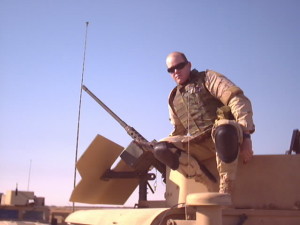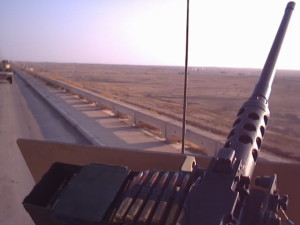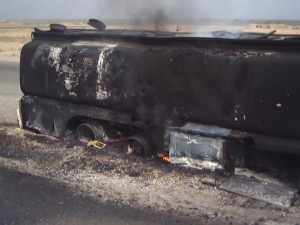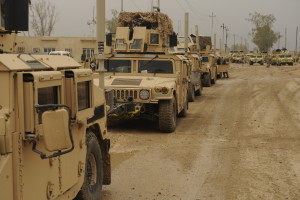 Of the many forms of conflict that we’re talking about this month, one of the more difficult kinds to write about is war. War is something you see on television. You read about it in novels. You talk about it with your friends. You complain about the money spent by the government, or the atrocities committed by those in the field. You wear your rose tinted goggles and scoff it from afar. But, unless you’re unlucky, it’s something that’s far away. I know, because I was there.
Of the many forms of conflict that we’re talking about this month, one of the more difficult kinds to write about is war. War is something you see on television. You read about it in novels. You talk about it with your friends. You complain about the money spent by the government, or the atrocities committed by those in the field. You wear your rose tinted goggles and scoff it from afar. But, unless you’re unlucky, it’s something that’s far away. I know, because I was there.
As far as the unlucky go, I was probably among the luckiest of them. I was deployed for just under a year to Balad, Iraq with the United States Air Force back in 2004. The Air Force loaned us to the Army to drive guntrucks. At first this meant large trucks with sandbags under us and metal welded on the side wherever we could put it for safety from explosives. Soon we received uparmored hum-v’s and things got much nicer. Our jobs was to drive alongside the convoys transporting equipment, food, and water all across Iraq.
I’ve seen lots of happiness and lots of horror in my year out there, however, I know I haven’t seen or experienced the worst of it. I have seen enough to know what novels get right and what they get wrong. Maybe some of my memories will help make your novel a little more real when it comes to fighting in a modern day war.
 The people I served with definitely come from all walks of life. While I call getting called upon to serve in a war zone as unlucky, some didn’t feel that way. I was supposed to be deployed three times, but I had someone offer to take my spot twice. The pay is good and the tax free benefits are especially enticing. Especially when you’re re-enlisting and have a bonus coming your way. You also have those out there that do it for the thrill. Some do it for the glory. And some honestly see it as the best way to help those in need. But one thing is true among all of us: the camaraderie. I’ve made strong bonds with people who I still call friends to this day. The soldiers you work with become your family. You rely on them and will trust them with your lives. If they can’t trust you, you’ll end up with the shitty jobs where they can just put you out of mind while they get the job done.
The people I served with definitely come from all walks of life. While I call getting called upon to serve in a war zone as unlucky, some didn’t feel that way. I was supposed to be deployed three times, but I had someone offer to take my spot twice. The pay is good and the tax free benefits are especially enticing. Especially when you’re re-enlisting and have a bonus coming your way. You also have those out there that do it for the thrill. Some do it for the glory. And some honestly see it as the best way to help those in need. But one thing is true among all of us: the camaraderie. I’ve made strong bonds with people who I still call friends to this day. The soldiers you work with become your family. You rely on them and will trust them with your lives. If they can’t trust you, you’ll end up with the shitty jobs where they can just put you out of mind while they get the job done.
The environment was different, but you get used to it quickly. When I arrived out there it was in the middle of the summer. Temperatures around 120F weren’t unheard of. Pallets of water were all over the base, and you got used to drinking hot water very quickly. We slept in tents at first and small trailers as they became available. Everything smells of diesel since most of the electricity is from generators. You also couldn’t get away from the hum of the generators and a/c units. It was the white noise that muffled the explosions.
When we first arrived, our base was attacked around three times a day. Sometimes you would hear the rocket fly overhead. Sometimes it would just be a small shadow that flashes by. When the munitions worked, however, you would always hear the explosion. Sirens would sound and you would take cover, but usually by then the attack was already over. Walking around outside was always an ordeal. At first there was a standing order that you would always wear your body armor and helmet. You would need to get suited up just to walk to the chow hall. Walking anywhere was like walking through a labyrinth of cement and dirt barriers. Every day was lived with the hope that you weren’t the ones at the wrong place at the wrong time. We didn’t really talk about it, but every now and then someone would stop and look up. The question of “What If” was always in your mind.
 Our missions involved leaving the relative safety of the base. We trained for months before even going overseas on how to operate outside the wire. Everything was drilled into us since even the small mistakes can cost you your life. Everywhere were the reminders of the horrors we faced. Roads were marred with pock marks of past IEDs. Every object was watched and avoided. Vehicles burned as we drove past from other convoys. At each checkpoint you would hear the stories. The convoy just in front or behind you was hit. Medivac was called for someone but get some rest because we’re moving out soon. And despite the questions and fears, you go and try to sleep since you might have another 10 hour ride ahead of you.
Our missions involved leaving the relative safety of the base. We trained for months before even going overseas on how to operate outside the wire. Everything was drilled into us since even the small mistakes can cost you your life. Everywhere were the reminders of the horrors we faced. Roads were marred with pock marks of past IEDs. Every object was watched and avoided. Vehicles burned as we drove past from other convoys. At each checkpoint you would hear the stories. The convoy just in front or behind you was hit. Medivac was called for someone but get some rest because we’re moving out soon. And despite the questions and fears, you go and try to sleep since you might have another 10 hour ride ahead of you.
People we passed watched us with guarded expressions as we passed. Some feared us. Some hated us. Some looked at us with hope. At least I want to believe it was hope. When you enter areas and you see people hiding, you duck down and hope nothing happens. Those are always the stressful times, since you never could tell what was happening. They seemed to know something you didn’t, and that’s always scary.
A year of doing runs like that can numb you to the pressures and fears you feel. You begin to feel like you’ve seen it all and that there was nothing else out there that could get to you. People handle that stress differently. I brushed it off and just went each day as usual. My personality didn’t let me dwell on things, but we didn’t lose anyone when I was over there. I’ve seen injury and responded to emergency blood donations, but that was it. I didn’t see anyone break, but I know it happens. Even coming back to the states wasn’t too different. You would still avoid objects in the road and you are hyper vigilant for a bit as you drive around town. At night when you lay in your bed you sometimes forget where you are and the silence is unusual.
It’s a different world, but the conflicts are universal. The stories we tell are of humanity. There are times where we are either brave or have bravery thrust upon us. How you handle the conflicts of life are what make us who we are. You’ve heard it all before, but it’s true. We read stories of war, misery, and pain because we understand the conflict. And as one who lived through it, believe me when I say it’s nicer to experience it behind the pages of a novel.
If you would like to read some great novels that are as close to a real deployment as possible, check out some of Myke Cole’s novels. He’s a fictorians guest author and another veteran who has seen the real thing. His novels definitely gave me flashbacks of Iraq. Well, with the exception of the magic. Everything is more awesome with magic.



 Of the many forms of conflict that we’re talking about this month, one of the more difficult kinds to write about is war. War is something you see on television. You read about it in novels. You talk about it with your friends. You complain about the money spent by the government, or the atrocities committed by those in the field. You wear your rose tinted goggles and scoff it from afar. But, unless you’re unlucky, it’s something that’s far away. I know, because I was there.
Of the many forms of conflict that we’re talking about this month, one of the more difficult kinds to write about is war. War is something you see on television. You read about it in novels. You talk about it with your friends. You complain about the money spent by the government, or the atrocities committed by those in the field. You wear your rose tinted goggles and scoff it from afar. But, unless you’re unlucky, it’s something that’s far away. I know, because I was there. The people I served with definitely come from all walks of life. While I call getting called upon to serve in a war zone as unlucky, some didn’t feel that way. I was supposed to be deployed three times, but I had someone offer to take my spot twice. The pay is good and the tax free benefits are especially enticing. Especially when you’re re-enlisting and have a bonus coming your way. You also have those out there that do it for the thrill. Some do it for the glory. And some honestly see it as the best way to help those in need. But one thing is true among all of us: the camaraderie. I’ve made strong bonds with people who I still call friends to this day. The soldiers you work with become your family. You rely on them and will trust them with your lives. If they can’t trust you, you’ll end up with the shitty jobs where they can just put you out of mind while they get the job done.
The people I served with definitely come from all walks of life. While I call getting called upon to serve in a war zone as unlucky, some didn’t feel that way. I was supposed to be deployed three times, but I had someone offer to take my spot twice. The pay is good and the tax free benefits are especially enticing. Especially when you’re re-enlisting and have a bonus coming your way. You also have those out there that do it for the thrill. Some do it for the glory. And some honestly see it as the best way to help those in need. But one thing is true among all of us: the camaraderie. I’ve made strong bonds with people who I still call friends to this day. The soldiers you work with become your family. You rely on them and will trust them with your lives. If they can’t trust you, you’ll end up with the shitty jobs where they can just put you out of mind while they get the job done. Our missions involved leaving the relative safety of the base. We trained for months before even going overseas on how to operate outside the wire. Everything was drilled into us since even the small mistakes can cost you your life. Everywhere were the reminders of the horrors we faced. Roads were marred with pock marks of past IEDs. Every object was watched and avoided. Vehicles burned as we drove past from other convoys. At each checkpoint you would hear the stories. The convoy just in front or behind you was hit. Medivac was called for someone but get some rest because we’re moving out soon. And despite the questions and fears, you go and try to sleep since you might have another 10 hour ride ahead of you.
Our missions involved leaving the relative safety of the base. We trained for months before even going overseas on how to operate outside the wire. Everything was drilled into us since even the small mistakes can cost you your life. Everywhere were the reminders of the horrors we faced. Roads were marred with pock marks of past IEDs. Every object was watched and avoided. Vehicles burned as we drove past from other convoys. At each checkpoint you would hear the stories. The convoy just in front or behind you was hit. Medivac was called for someone but get some rest because we’re moving out soon. And despite the questions and fears, you go and try to sleep since you might have another 10 hour ride ahead of you. One of my favorite tv shows of late is Castle. What’s not to love? Nathan Fillion is awesome, fights crime, and is an author! He’s who I want to be when I grow up. One of the subplots, and it’s almost getting to the point to where it’s cliche, is the love relationship between Richard Castle and Kate Beckett. Everyone knew from day one that the sexy co-star would eventually end up with the strong protagonist. In fact, I’m sure that even those who have never seen the show know exactly what I’m talking about. The formula is as old as time, so why does it keep happening? Or, perhaps a better question, why is it still so exciting?
One of my favorite tv shows of late is Castle. What’s not to love? Nathan Fillion is awesome, fights crime, and is an author! He’s who I want to be when I grow up. One of the subplots, and it’s almost getting to the point to where it’s cliche, is the love relationship between Richard Castle and Kate Beckett. Everyone knew from day one that the sexy co-star would eventually end up with the strong protagonist. In fact, I’m sure that even those who have never seen the show know exactly what I’m talking about. The formula is as old as time, so why does it keep happening? Or, perhaps a better question, why is it still so exciting?